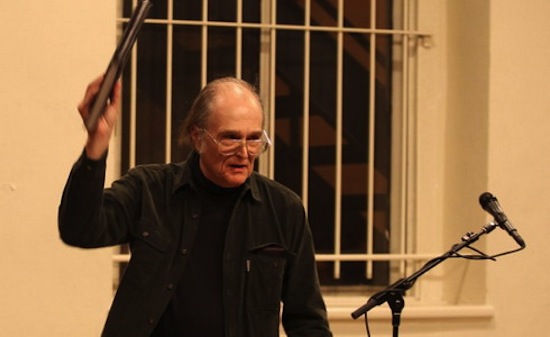An engagement with language’s musicality plays a significant role in the writing of Clark Coolidge. His poetical works are diverse in form and content reflecting the longevity of his career, and yet an interest in bebop continues to influence his writing (Coolidge himself is also a jazz drummer). His latest offering, 88 Sonnets, is no exception; one trips across these poems with their multitude of riff-like disjuncts, ever aware of his brilliant use of caesura. As one progresses through the text, one finds that the work seems to heave itself together, growing exponentially, far beyond the smallish sonnet form. Indeed in this respect the poems rely on an accumulative effect – an amassing of Coolidge’s lyrical voice, which rings consistently despite the sonnets’ apparent stop/start form. He knows which words fit together, and he also understands that there are those that don’t. He uses this knowledge to construct a poetical logic – you’re invited in, try to keep up:
Body rejects all over the blowback
I bet your moondust came in a can
a novel of no future too late
Coolidge’s logic heeds the potentially broad impact of each word, as can be seen above with "Body rejects", which insinuates multiple discarded bodies whilst also describing the refusal of "all" by a singular body. The words are heavy with meaning, and his caesurae enact a mute shout: what is left out? As the gaps accumulate one grows acutely aware of myriad unwritten sentiments, bubbling up but never quite surfacing. Whilst Coolidge’s wide spaces act as punctuation, signifying a break of sorts ("no future too late"), their ostentatiously visual quality also serves to heighten the connection between the sets of words, developing the gaps beyond the finality of a full-stop or the meditating pause of an ellipsis. There is an ambiguity to Coolidge’s gaps; "too late" might be intoned by the same voice as "no future", or it could be a different voice. These spaces perpetuate a sense of schizophrenic cacophony; an endless stream of interrupted expression.
Consider ‘Revolving Glands and Huge Blonde Eyes’, in which various contradictory descriptions are metonymically observed:
many varieties of darkness depths of chest
in one her car runs on divorce settlements
at which she toils like a sister nice pointy little
paintings but there’s no floor beneath this one
In keeping with the poem’s title, the "divorce settlements" and "nice pointy little" allude to a woman, stereotypically objectified. Then consider the "Revolving Glands", and the "many varieties of darkness depths of chest": heart, pulse, and a cavernous echo of unknown are added to this woman type, and divorce settlements are only one part of this depth. The ambivalent thrum that underpins Coolidge’s sparing and allusive work is brought to the fore. In relation to these sparse yet richly emblematic lines, consider William Wordsworth’s proposition, written in his 1800 Preface to Lyrical Ballads, that "the feeling therein developed gives importance to the action and situation, and not the action and situation to the feeling." He is calling for a reading of his poetry that is engaged in feelings, which, when expressed in poetical form, have the capacity to relay the magnitude of what on first glance might seem an insignificant incident.
Returning to Coolidge’s text, one discovers a work that, as discussed above, seems much larger than the sum of its constituent parts. Just as Wordsworth draws attention to the importance of feeling, so Coolidge allows those feelings to be felt by his reader in the ellipses, the missed-out words, the ambiguous suggestions. This is a collection of poems across which there can be no singular conclusive reading. With this strangely subjective logic, the world described in 88 Sonnets appears to exist within its own prescribed reality. For example, in ‘Shop Talk / Talcum Top’:
Some tough phonecalls in an iron bucket
I had the building nipped under me
Talk is written all over; in the title, with "Talk" and then "Talcum", which might be a sort of talk with, "talc-cum", and then straight into phone calls. We understand that this is hard talk, "Shop Talk", "tough", "iron", all seemingly solid until the foundations slip away: "the building nipped under me". Attempting to interpret this as a rational sequence of events, the reader is either left flummoxed or disappointed by the somewhat less spectacular translation. Not because Coolidge is producing nonsense, but because his work is drawn from a clamorous multitude of media. In an interview he described how he writes with the television on, "because you have everything: you have the sound, you have language, images, everything, so you can riff in and out of that."
In this respect these sonnets read like cutups, broken and bleeding into each other with abandon. Coolidge relentlessly heaps on disjointed passage after passage, so that it becomes difficult to say exactly where one poem ends and the next begins. I would argue that he should be commended for this project, as he does not fall sucker to the advertisement of catchy favourites. There are no ‘hits’ in 88 Sonnets despite Coolidge’s obvious linguistic aptitude.
So slow death oft the onyx dolls
each in its own lab colors rollicking encores
who’s there? do you want your museum
room infiltrated?
Coolidge does not luxuriate in his ability to engage and transfix his reader in a hypnotic state, suddenly cutting off the rolling lyrical melody and rollicking encores: "who’s there?"
Whilst reading 88 Sonnets I was reminded of Theodor Adorno’s statement regarding "artists of the highest rank" for whom "the sharpest sense of reality was joined with estrangement from reality". Departing from the mundanity of day-to-day life, Coolidge invites his readers to traverse a landscape that has grown unfamiliar. Reality bends in "A Crystal Saw", as "rocks … pop like bulbs". Yet despite the weirdness of this event, the possibility of these rocks popping suddenly seems as plausible as rocks plopping like raindrops. For Adorno, this project of estrangement serves to make the state of reality more apparent; by observing an unfamiliar landscape, our own habitat can start to seem comparatively odd. Previously taken-for-granted circumstances are destabilised as we look at our surroundings in a new light.
When reading work that avoids a definitive coherence like that of Coolidge, it is worth considering the value of what it means to get something. By this I am referring to the sort of pedagogical question that might be asked in a bad poetry class, "Did you get it?" Stripping the work of its right to exist without total comprehension – without being totally ‘got’ – anything superfluous to a singular reading is dismissed as anomalous or is simply ignored. Following the value that Adorno discovers in the process of defamiliarisation, one begins to realise that this method of ‘getting’, by which Coolidge’s poetry might be described as exclusively metaphorical and cryptological, is absurdly reductive. Once something has been ‘got’, it can then be discarded; it has been owned, used, and now it is over. The powerful quality of an expressionistic work of art is that it manages to avoid this banal commodification. Coolidge is remarkable when you don’t quite get it, when the "many varieties of darkness depths of chest" remain deep and open.
The title ‘A Scream in a Box’ is startling, impossibly loud, an entire scream caught, and is a great description of 88 Sonnets in its entirety. In this sonnet Coolidge writes:
there’s no taste like bona fide mouthwash
turn of the car at the end of the road
steady up Powder Boy the clots are about to descend
Again one finds the schizophrenic leaps, the multitude of voices that heighten and build into a climactic roar, or is it a whisper, and then the book snaps shut.

88 Sonnets is out now, published by Fence


